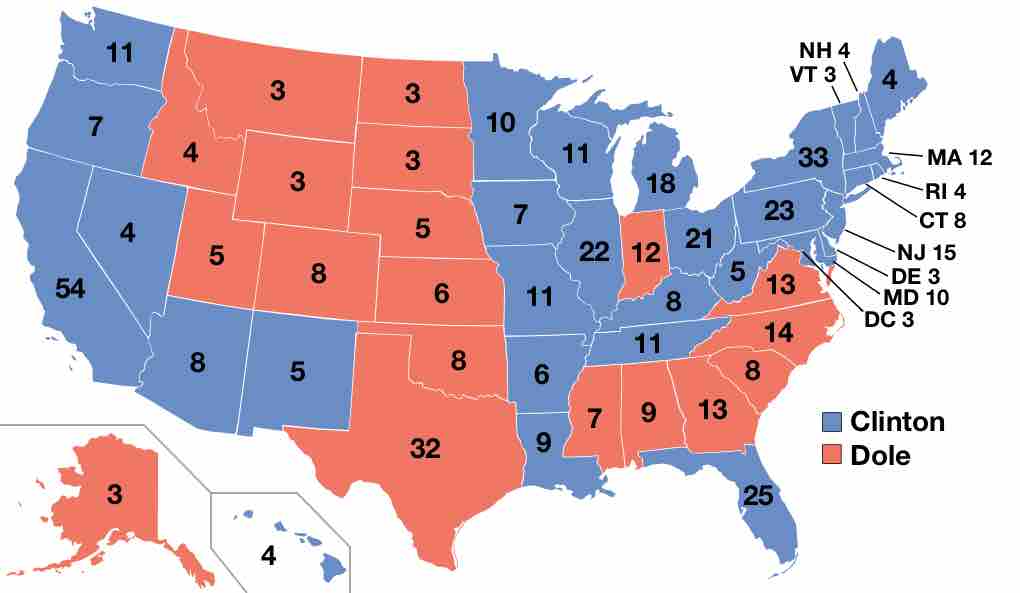Overview: the 1996 Presidential Election
The United States presidential election of 1996 was a contest between the Democratic national ticket of incumbent President Bill Clinton of Arkansas and Vice President Al Gore of Tennessee and the Republican national ticket of former Senator Bob Dole of Kansas for President and former Housing Secretary Jack Kemp of New York for Vice President. Businessman Ross Perot ran as candidate for the Reform Party with economist Pat Choate as his running mate. Clinton benefited from an economy which recovered from the early 1990s recession and a relatively stable world stage. On November 5, 1996, President Clinton went on to win re-election with a substantial margin in the popular vote and electoral college.

Bob Dole, Republican presidential candidate in 1996
Bob Dole lost the 1996 presidential election by a wide margin.

Ross Perot
Henry Ross Perot is an American businessman best known for running for President of the United States in 1992 and 1996.
Republican Primaries
A number of Republican candidates entered the field to challenge the incumbent Democratic President, Bill Clinton. The fragmented field of candidates debated issues such as a flat tax and other tax cut proposals, as well as a return to supply-side economic policies popularized by Ronald Reagan. More attention was drawn to the race by the budget stalemate in 1995 between the Congress and the President, which caused temporary shutdowns and slowdowns in many areas of federal government service. In the Republican Primaries, Bob Dole emerged as the successful candidate to run against Clinton and Perot.
The General Election Campaign
With respect to the issues, Bob Dole promised a 15% across-the-board reduction in income tax rates. Bill Clinton framed the narrative against Dole early, painting him as a mere clone of unpopular House Speaker Newt Gingrich and warning America that Dole would work in concert with the Republican Congress to slash popular social programs, like Medicare and Social Security. Dole's tax-cut plan found itself under attack from the White House, who said it would "blow a hole in the deficit" which had been cut nearly in half during his opponent's term.
Throughout the run-up to the general election, Clinton maintained comfortable leads in the polls over Dole and Perot. The televised debates featured only Dole and Clinton, locking out Perot and the other minor candidates from the discussion. Perot, who had been allowed to participate in the 1992 debates, would eventually take his case to court, seeking damages from not being in the debate and citing unfair coverage from the major media outlets.
Results
On election day, President Clinton won a decisive victory over Dole, becoming the first Democrat to win presidential reelection since Franklin Roosevelt. In the popular vote, he outpolled Dole by over 8.2 million votes. The Electoral College map did not change much from the previous election, with the Democratic incumbent winning 379 votes to the Republican ticket's 159.
In the West, Dole managed to narrowly win Colorado and Montana (both had voted for Clinton in 1992), while Clinton became the first Democrat to win the state of Arizona since Harry Truman in 1948. Although he hailed from Arkansas, Clinton carried just four of the eleven states of the American South, illustrating a broader decline in support for the Democratic Party in the South. In the 2000 and 2004 elections, the Democrats would fail to carry even one of the Southern states, contributing to their defeat both times. The election helped to cement Democratic Presidential prospects in states including California, Vermont, Maine, Illinois, New Jersey, Pennsylvania, Michigan, Delaware, and Connecticut. All went on to vote Democratic in subsequent Presidential elections, having voted Republican in the three prior to 1992.
Reform Party nominee Ross Perot won approximately 8% of the popular vote, less than half of his performance in 1992. The 1996 national exit poll showed that just as in 1992, Perot's supporters drew from Clinton and Dole equally. In polls directed at Perot voters as to who would be a second choice, Clinton consistently held substantial leads.

1996 presidential election results
Clinton won re-election in 1996, as seen in this Presidential election results map. Red denotes states won by Dole/Kemp, Blue denotes those won by Clinton/Gore.